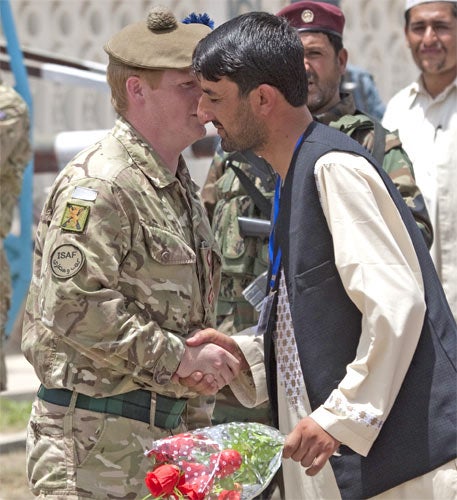After five years, UK troops return control of Helmand capital
Kim Sengupta witnesses a key step in transition as Lashkar Gah is handed over

Five years, two months and 19 days after the Union Flag was raised in Lashkar Gah, heralding one of the bloodiest deployments in the UK's recent military history, the capital of Helmand province passed to Afghan control yesterday.
The handover, with British armoured vehicles rolling out of the city centre was as much symbolic as strategic, a milestone on the exit route from a long and costly war. The heart of operations for the UK mission had been among the first to be chosen for "transition" because of a dramatic fall in violence over the past year, a sign, the Western coalition insists, that the Taliban are in retreat from the area.
Threats by the insurgents to disrupt the day failed to materialise. But, their offensive, which has claimed the lives of a number of senior officials, including Ahmed Wali Karzai, the brother of the Afghan President, continued with attacks across the country, including a bicycle bomb in the northern city of Mazar-i-Sharif which killed seven people, including a young boy. On Monday, seven policemen were killed at a checkpoint near the city, and two British soldiers had died in the province last week.
But Afghan forces kept Lashkar Gah safe yesterday as they had done for the previous months, and there was obvious pride in that. At the end of yesterday's handover the British soldiers and US Marines were ceremonially asked to depart, and, as they left, were handed bunches of flowers.
There was, however, a degree of unease among senior Afghan officials present at the timeline for the overall disengagement of Western troops from the country, the start of 2015. Colonel Amin Jan, chief of staff of the 3rd Brigade, 315 Kandak (battalion) believed this would lead to problems. He was also deeply sceptical of another plank of the Western policy: negotiations with the enemy.
The insurgents, he claimed, were being controlled by Pakistan and were in no position to deliver and on any pledges peace. "I don't believe in negotiating with the Taliban... They are not independent, they are controlled by others, some of our neighbours, who think Isaf [International Security Assistance Force] and coalition forces are defeated in Afghanistan and they are leaving. But we will continue fighting.
"Also, four years is too short a time for Isaf to leave. We still lack some equipment...We will see if this leads to any problems. We can ask the international forces to help with this."
Gulab Mangal, the Governor of Helmand, also sounded a note of warning. He pointed out that in 1989, having used the Mujaheddin against the Russians, the West abandoned Afghanistan civil war and fundamentalism.
He acknowledged that similarly in 2001, after the fall of the Taliban, the West had again neglected his country and marched into Iraq, despite Tony Blair's promise that "this time we will not walk away".
Mr Mangal said: "The US and UK must understand that the problem of terrorism is an international one and not just something Afghan, so it is in all our interest to stay united and help each other."
Meanwhile, said the Governor, insurgent leaders such as Mullah Omar, the former head of the Taliban regime, who refuse to stop fighting should be eliminated. "The killing of Osama bin Laden by the US forces had a positive effect in getting a lot of them [insurgents] to come into the reintegration process. I think the same will happen with Mullah Omar."
The vast majority of the citizens of Lashkar Gar were on the outside of the security cordon for yesterday's formalities and many were unaware of what was taking place.
Join our commenting forum
Join thought-provoking conversations, follow other Independent readers and see their replies
Comments
Bookmark popover
Removed from bookmarks